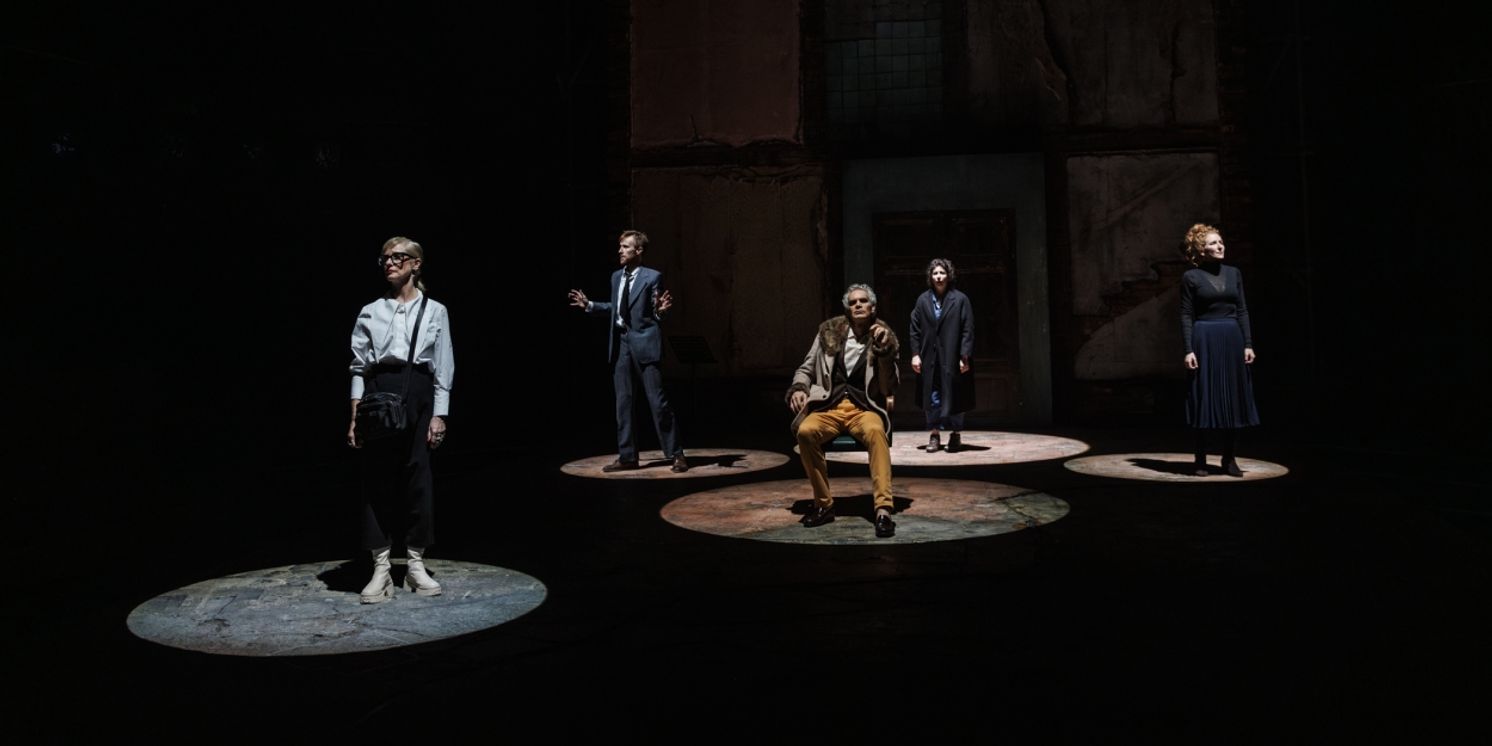Review: NACHTLAND, Young Vic
A nervous, difficult play with a blurry purpose.

![]() Is it really possible to separate the art from the artist? It’s a conversation that’s recently risen in popularity, in theatre too. Nicola and Philipp are clearing out their late father’s home when they stumble upon an interesting artefact. The depiction of an anonymous street from 1910s Vienna bears the name of a man who, when rejected from the fine arts, turned to dictatorship. The members of the family have a clash of opinions regarding what should be done with it. Should they keep it, sell it, or burn it?
Is it really possible to separate the art from the artist? It’s a conversation that’s recently risen in popularity, in theatre too. Nicola and Philipp are clearing out their late father’s home when they stumble upon an interesting artefact. The depiction of an anonymous street from 1910s Vienna bears the name of a man who, when rejected from the fine arts, turned to dictatorship. The members of the family have a clash of opinions regarding what should be done with it. Should they keep it, sell it, or burn it?
Translated from German by Maja Zade, Marius von Mayenburg’s bleak satire treads a fine line. A bit absurdist here and there with more than a dash of political incorrectness in its astonishing reflections on politics, it’s a savage scene. Director Patrick Marber, fresh off of directing Tom Stoppard’s Leopoldstadt, plays a dangerous game of satirical provocation and discomfort.
The main problem is that the production is riddled with tonal insecurity. What should be a full-blown instigation from contemporary Germany swerves into a farce one too many times, trying to make the piece a wacky dark comedy. This ambiguity clashes with the self-assured, excellent and thoroughly thought-provoking debates contained in it. But the spellbinding political addresses aren’t the only parts that are being watered down by the show’s lack of identity, the sophistication of the writing also gets lost amid the miscalculated rubble of dialogue that wraps onto itself, leading nowhere.
Because of the impressive philosophical excavation and defensive reasoning that supports the characters’ choices in regard to the painting, the constant turns into lightweight humour are exceedingly frustrating as von Mayenburg establishes a bountiful list of topics to discuss instead. The ethics of money and the problematic ancestral legacies are only the cream on top of an intellectually lush dessert. Moral bankruptcy and the weaponisation of free speech lie just below it, while the threat of antisemitism props up the core of the play: human hypocrisy.
Now, imagine taking a bite of this glorious layered cake only to find out it's insipid. As if the delivery and ambiguous stance weren’t enough, the discourteous jabs to Judaism and its role in history grate against the current political climate. It’s alarming to think what could happen if the wrong kind of crowd attended a performance. This said, we wonder if the issues solely belong to the translation - German banter hardly lends itself to a British ear.
While the text has its own irresolvable problems, the company are a striking group. Jane Horrocks comes out on top as the rockstar art expert with a flashy fashion sense, while the couples (John Heffernan and Jenna Augen, Dorothea Myer-Bennett and Gunnar Cauthery) do an okay job at reconciling the characters’ complicated beliefs with Marber’s slant. The casus belli of a man who’s very interested in the optics of being married to a Jewish person, his irritating sister whose husband is a bit of a knob, and the bonkers people they’re wedded to becomes even more morbidly bizarre when they’re in conversation with a Hitler fanatic (Angus Wright in fabulous form).
As flawless as their comic timing might be, the sarcasm of their delivery doesn’t entirely sit well with the relentlessly jolly irony of Zade’s script. It’s a pity, the subject has remarkable potential and the production is visually exquisite. Designer Anna Fleischle sets the scene in the shadow of the derelict façade of the patriarch’s home. Below, as the public comes in, the large thrust is a junkyard of memories and a collection of frankly enviable vintage objects. The space tells a story even before the show begins. The actors come on stage and declutter it before starting the narration. They embed the active dialogue between bouts of direct address that move the narrative forward, explaining themselves but mostly chasing their tails.
Richard Howell’s lighting takes an expressionist angle cyclically, caging the single performers in defined pools of light and insulating their thoughts during the crucial points.
At the end of the day, Nachtland is a nervous, difficult play with a blurry purpose. It doesn’t revel as much as it should in the unknotting of its cerebral conundrums and it doesn’t bask in the incredible satire it holds. The ideas it presents are topical, yet the piece is distracted. It tries to be quirky and different, but the result is tired and unfocused. It will make audiences think and talk about what they just saw, but not necessarily in a good way.
Nachtland runs at the Young Vic until 20 April.
Photo credit: Ellie Kurttz
Reader Reviews
Videos

